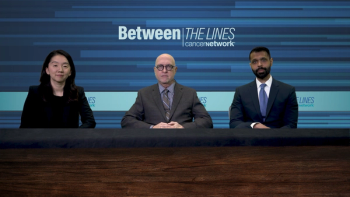Nivolumab Plus Chemotherapy vs Chemotherapy as First-Line Treatment of Advanced Gastric Cancer/Gastroesophageal Junction Cancer/Esophageal Adenocarcinoma: Five- Year Follow-Up Results From CheckMate649

Panelists discuss how advanced gastric cancer treatments currently include surgery, chemotherapy (primarily platinum/fluoropyrimidine combinations), targeted therapies (trastuzumab for HER2-positive disease, ramucirumab), and immunotherapy (pembrolizumab and nivolumab in select patients). Despite these options, major unmet needs persist, with low survival rates, lack of predictive biomarkers beyond HER2, limited effective treatments after first-line therapy, poor response rates to immunotherapy, and high treatment toxicity affecting quality of life. Many patients also present with late-stage disease due to delayed diagnosis.

Panelists discuss how the CheckMate649 study was a randomized trial that compared nivolumab plus FOLFOX (leucovorin, fluorouracil, oxaliplatin) chemotherapy with chemotherapy alone for treating advanced gastric cancer, gastroesophageal junction cancer, and esophageal adenocarcinoma. The study results found that nivolumab plus chemotherapy improved overall survival and progression-free survival compared with chemotherapy alone.

Panelists discuss how the long-term follow-up data from CheckMate649 are crucial for understanding the durability of nivolumab plus chemotherapy’s benefit in first-line advanced gastric cancers (GCs)/gastroesophageal junction cancers (GEJCs). The survival outcomes help validate this regimen’s position as a standard of care, particularly for patients with PD-L1 combined positive score (CPS) ≥ 5. Although the magnitude of benefit varies by PD-L1 expression, both overall survival (OS) and progression-free survival (PFS) data inform personalized treatment decisions, with stronger evidence supporting immunotherapy use in higher PD-L1–expressing tumors while maintaining use across most patient subgroups.

Panelists discuss how the adoption of immunotherapy-chemotherapy combinations in clinical practice requires careful consideration of both long-term safety profiles and sustained efficacy data. A 5-year follow-up period generally provides valuable insights into delayed adverse events and durability of response, which helps inform risk-benefit assessments. The balance between safety and efficacy should be evaluated on a patient-specific basis, considering factors such as performance status, comorbidities, and tumor characteristics.

Panelists discuss how balancing treatment intensity with quality of life remains a critical challenge in advanced gastric cancers (GCs) and how implementing biomarker-driven approaches such as PD-L1 combined positive score (CPS) testing faces practical hurdles in clinical settings. Key considerations include optimizing patient outcomes while managing adverse effects and addressing barriers such as testing accessibility, result turnaround time, and standardization of biomarker interpretation.

Panelists discuss how the 5-year survival data for nivolumab plus chemotherapy underscore its sustained efficacy as a first-line treatment, showing durable benefits over alternatives. Further research, including real-world evidence and broader clinical trials, is needed to validate its long-term impact across diverse patient populations and cancer subtypes.

Panelists discuss how future analyses in advanced gastric cancer should assess long-term survival, real-world outcomes, biomarkers for response, resistance mechanisms, and patient selection for nivolumab plus chemotherapy. Evaluating these factors will optimize treatment strategies and confirm its role across diverse populations.

Results from the CheckMate649 trial support the use of nivolumab plus chemotherapy in the treatment of advanced gastric cancers.



